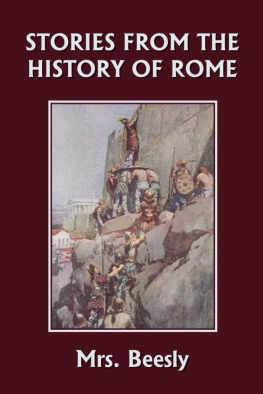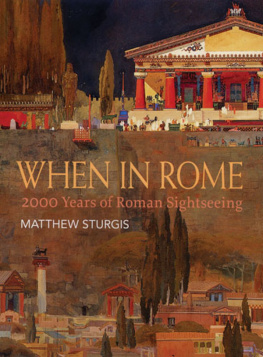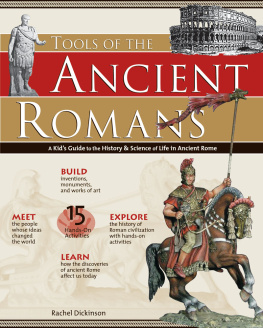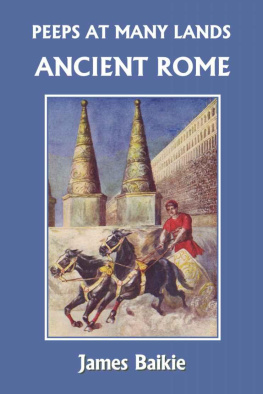Mrs. Beesly - Stories from the History of Rome
Here you can read online Mrs. Beesly - Stories from the History of Rome full text of the book (entire story) in english for free. Download pdf and epub, get meaning, cover and reviews about this ebook. year: 2008, publisher: Yesterdays Classics, genre: History. Description of the work, (preface) as well as reviews are available. Best literature library LitArk.com created for fans of good reading and offers a wide selection of genres:
Romance novel
Science fiction
Adventure
Detective
Science
History
Home and family
Prose
Art
Politics
Computer
Non-fiction
Religion
Business
Children
Humor
Choose a favorite category and find really read worthwhile books. Enjoy immersion in the world of imagination, feel the emotions of the characters or learn something new for yourself, make an fascinating discovery.
- Book:Stories from the History of Rome
- Author:
- Publisher:Yesterdays Classics
- Genre:
- Year:2008
- Rating:5 / 5
- Favourites:Add to favourites
- Your mark:
- 100
- 1
- 2
- 3
- 4
- 5
Stories from the History of Rome: summary, description and annotation
We offer to read an annotation, description, summary or preface (depends on what the author of the book "Stories from the History of Rome" wrote himself). If you haven't found the necessary information about the book — write in the comments, we will try to find it.
Stories from the History of Rome — read online for free the complete book (whole text) full work
Below is the text of the book, divided by pages. System saving the place of the last page read, allows you to conveniently read the book "Stories from the History of Rome" online for free, without having to search again every time where you left off. Put a bookmark, and you can go to the page where you finished reading at any time.
Font size:
Interval:
Bookmark:
All rights reserved. No part of this book may be reproduced or retransmitted in any form or by any means without the written permission of the publisher.
This edition, first published in 2010 by Yesterday's Classics, an imprint of Yesterday's Classics, LLC, is an unabridged republication of the work originally published by Macmillan and Company in 1878. This title is available in a print edition (ISBN 978-1-59915-264-6).
Yesterday's Classics republishes classic books for children from the golden age of children's literature, the era from 1880 to 1920. Many of our titles are offered in high-quality paperback editions, with text cast in modern easy-to-read type for today's readers. The illustrations from the original volumes are included except in those few cases where the quality of the original images is too low to make their reproduction feasible. Unless specified otherwise, color illustrations in the original volumes are rendered in black and white in our print editions.
The writer of this little book was not satisfied that her children should hear nothing but fairy tales and the stories of nursery life, now so popular. But she could find nothing else fit to read to them. There are, indeed, plenty of story-books drawing their materials from history, and professing to be intended for children. But they are not suited to very young children. They abound in words and ideas which a child of four or six years old not only does not understand, but cannot be made to understand. The writer, however, believed that it was quite possible to put portions of Livy and Plutarch into language which should need little or no explanation even to children of that age. She accordingly made the experiment. One story after another was written and read to her little boys. Whenever she discovered that a word or idea was unintelligible to them, she took pains to simplify it. She found that they thoroughly enjoyed these old tales from Roman history, and liked to hear them repeated again and again. She has thought, therefore, that if published they might perhaps supply a want that may have been felt by other parents.
It was necessary that the stories should be such as would interest little children. But the writer has also selected them with a view to illustrate the two sentiments most characteristic of Roman mannersduty to parents and duty to country. She has, moreover, tried to indicate that the latter of these sentiments took precedence of the former. A healthy moral lesson is thus conveyed, while at the same time the most essential feature of the Roman civilization is impressed on the memory.
Probably no one will be found to raise the dull objection that many of these tales are not strictly true. Being typical of Roman manners, they are true in a more real sense than many a well attested but less, characteristic fact. They undoubtedly helped to create in Romans those virtues which they professed to record. To the young, aye, and to older persons, it is more important to have heard that Brutus beheaded his sons and that Mucius thrust his hand into the flame, than to be acquainted with the most approved theories as to the origin of the Plebs or the functions of the three Comitia. May it be long before these old legends are banished from Roman history in the name of a pedantic and unprofitable accuracy!
T HERE once reigned in a town called Alba in Italy a king whose name was Numitor. He had a brother called Amulius, who was a proud and wicked man, and could not bear that his elder brother should be king over him. So Amulius plotted against his brother. He got together a number of men who were as bad and cruel as himself, and they attacked Numitor and drove him from his throne, and made Amulius king in his stead. They took the sons of Numitor, and his daughter Rhea Silvia, and killed them. Then Amulius seized the two little sons of Rhea Silvia, who were still only babies; he gave them to his soldiers, and told them to throw the poor little boys into the River Tiber.
"Then," thought he, "they will be drowned. There will be none of my brother's children left to trouble me, and I shall be king all my life."
The soldiers took the two babies in their cradle, lying side by side fast asleep, and carried them to the river.
Now, there had been a great deal of rain, and the Tiber had overflowed its banks, so that the men could not put the children in the deep part of the river, but only at the edge, where the water was shallow. However, they thought that they would have obeyed the orders of Amulius if they left the little boys there. So they put the cradle down in the water, and went away.
But the sun was shining, and the waters were sinking fast; soon the dry land began to show itself; the cradle stood still, and the waters left it on the bank and ran back into their bed.
There lived not far from the Tiber a shepherd whose name was Faustulus. He was walking by the side of the river, when he saw a cradle lying under a fig-tree, and beside the cradle stood a great she-wolf. Faustulus was very much astonished, and ran quickly to see what this might mean. When he got near, he saw that in the cradle were two beautiful little baby boys, and the wolf was feeding them with her milk, just as if they had been her own little ones. But when she saw Faustulus, she fled away into the woods; and he took the children and carried them home to his wife. So these two kind people loved the boys and brought them up like their own sons.
Romulus and Remus, so the boys were called, grew up strong and bold and active. They did not care to till the ground and herd the cattle, but loved to hunt in the woods and mountains. Sometimes, too, they would attack the robbers whom they met in that wild land, and take their plunder from them. So, it happened that many young men from the country round came to them and joined their expeditions, and of these Romulus and Remus were always the chiefs and leaders.
Faustulus had heard that two grandsons of the king had been thrown into the Tiber, and he guessed that these must be the boys he had found. When Numitor, their old grandfather, heard of these two young men, he too thought they must be his daughter's sons. Then Romulus and Remus took their friends and companions with them, and went to Alba. They attacked King Amulius and killed him. When Numitor heard of what had happened, he called the Alban nobles together, and told them of all the wrongs he had borne from his brother, and all the story of his grandsons. While he was still speaking, the two brothers marched with their followers into the midst of the assembly, and they hailed their grandfather as King of Alba, to the great joy of all the Alban people.
Now Romulus and Remus were not content to stay at Alba with their old grandfather; but they determined to build a new city for themselves. They made up their minds that this new city should be near the River Tiber, on the spot where they were found by Faustulus when they were little babies. So they took their companions with them, and went to that place. There was still growing the fig-tree under which their cradle had lain, and they resolved that they would build their walls there, and leave the fig-tree standing in the midst. For hundreds of years afterwards the fig-tree was to be seen standing in one of the chief streets of Rome.
Font size:
Interval:
Bookmark:
Similar books «Stories from the History of Rome»
Look at similar books to Stories from the History of Rome. We have selected literature similar in name and meaning in the hope of providing readers with more options to find new, interesting, not yet read works.
Discussion, reviews of the book Stories from the History of Rome and just readers' own opinions. Leave your comments, write what you think about the work, its meaning or the main characters. Specify what exactly you liked and what you didn't like, and why you think so.













